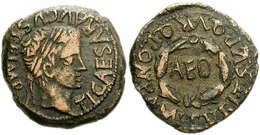Mints of Spain
Coins | Mint
c. 500 BC/BCE to modern times
The ancient coins of the Spanish peninsula are of the following classes: Greek, Phoenician, Hispano-Carthaginian, Romano-Iberian, and Roman. The earliest coins struck in Spain (in late 6th or early 5th century BC) consist of small divisions of the Phocaic drachm, Thirds, Sixths, Twelfths, and Twenty-fourths, weighing respectively about 18, 9, 4½, and 2¼ grains. After the Roman occupation it started minting Imperial coins and after that period the most known coins are of the Visigoths until the 8th century CE. Then it continued to issue coins in Medieval times and in modern times as well.
Subject ID: 128679
Morec. 500 BC/BCE to modern times
The ancient coins of the Spanish peninsula are of the following classes: Greek, Phoenician, Hispano-Carthaginian, Romano-Iberian, and Roman. The earliest coins struck in Spain (in late 6th or early 5th century BC) consist of small divisions of the Phocaic drachm, Thirds, Sixths, Twelfths, and Twenty-fourths, weighing respectively about 18, 9, 4½, and 2¼ grains. After the Roman occupation it started minting Imperial coins and after that period the most known coins are of the Visigoths until the 8th century CE. Then it continued to issue coins in Medieval times and in modern times as well.
Subject ID: 128679
Curators
Subject ID: 128679


Filters
Collectible Types
Curators
2.75
2.75
Roman Provincial, Tiberius (14 - 37 CE), Bronze As, Spain, Turiaso mint
- Obverse: TI CAESAR AVG F AVGVSTVS IMP PONT / Laureate head right.
- Reverse: MVN TVRIASO MN SVLP LVCAN M SEMP FRONT / II VIR within oak wreath
Reference:
- RPC I 413
- Burgos 2455
- Vives 156–6, 7
- GMI 364
- Hill 33-7
Other Information:
- Issued under Marcus Sempronius Front(o) and Manius Sulpicius Lucanus, duovirii
- Type: Coins
- Released: 14 null BC/BCE (Estimated)
- Discontinued: 37 null BC/BCE
- Related Subjects: Mint of Turiasu , Mints of Spain , Roman Empire , Tiberius
Roman Provincial, Tiberius (14 - 37 CE), Bronze Semis, Spain, Turiaso mint
- Obverse: TI CAESAR AVGVST F IMP / Laureate head right.
- Reverse: MVN TVRI T SVLP QVAR Q PONT PLA/ oak wreath containing AED
Reference:
- RPC I 414
- Vives 156-8
- Hill 34-4
Other Information:
Issued under Q Pont Pla and T Sulp Quar, aediles
- Released: 14 null BC/BCE
- Discontinued: 37 null BC/BCE
- Related Subjects: Mint of Turiasu , Mints of Spain , Roman Empire , Tiberius
2.75
2.75
- Type: Coins
- Released: 14 null BC/BCE (Estimated)
- Discontinued: 37 null BC/BCE
- Related Subjects: Mint of Turiasu , Mints of Spain , Roman Empire , Tiberius
Roman Provincial, Tiberius (14 - 37 CE), Bronze Semis, Spain, Turiaso mint
- Obverse: TI AVGVSTVS AVGVSTI F IMP / Laureate head right.
- Reverse: MVN TVRIASO MARIO VEGE LICI CRES / oak wreath containing AED
Reference:
- RPC I 416
- Hill 34-3
Other Information:
Issued under Lici Cres and Marius Vege, aediles
- Released: 14 null BC/BCE
- Discontinued: 37 null BC/BCE
- Related Subjects: Mint of Turiasu , Mints of Spain , Roman Empire , Tiberius



